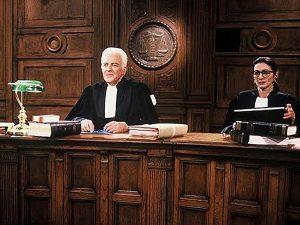Williams v Williams: Williams V Williams is a 1987 locus classicus case under the principles of custody in family law. In this case, the court considered `a number of factors which must be taken into consideration in the grant of custody of a child to the father, the mother or anyone at all. The case also brought to life the principle that the court has the power to make split orders, that is, joint custody.

Recommended: How To Choose The Right Business To Start
Facts Of The Case Of Williams v Williams
The Appellant, Theresa Temitaoyo Williams was married to the Respondent, Rasheed Ahmed Williams. Their marriage took place in London in 1963. After the marriage, they lived together in London and in Lagos. The marriage was blessed with three children; two boys and one girl. Later on, the marriage broke down and the parties started living apart from October 1st, 1975 by the Appellant’s act of desertion. The husband, Rasheed filed the petition for dissolution of the marriage.

According to the testimony of the Respondent and the evidence available before the court, the two boys of the marriage were taken to England for their education, where they were enrolled into boarding schools; Abbey Junior School, Kent, England, and subsequently were transferred to King’s School England. The Respondent was with them in England and he established the boys to have spent greater part of their lives with him. Also he had a lady friend who comes around to take care of the boys alongside himself. Their only daughter, Kafilat Abimbola Williams was living with the Appellant.
Also see: Advantages and Disadvantages of Quantitative Research
The Respondent established that he made several efforts to have the custody of the daughter or at least have a say in her education, pay her school fees and so on. This includes letters written to the Appellant tendered and admitted as Exhibits. The Respondent had not seen their daughter for years. The Respondent further established in his testimony, that the Appellant had not time for their daughter whom she has custody over. That as a Chief Magistrate, she had zero time for the daughter, because she leaves for work as early as 7.00am and returns late in the evening.

That what she habitually did was to leave their daughter in the custody of a maid whom she engaged to take their daughter to school by taxi. That after school dismissal by afternoon, one of her two friends, according to the arrangement, would go and pick up the daughter for her to stay with them until the Appellant returns from work in the evening. That also, the Appellant regularly travels out of the country and while travelling, she lives their daughter in the custody of her friends. The Respondent in his petition for dissolution of marriage prayed the court to grant him custody of their daughter and as well sustain the custody which he already has in respect of their two sons. At the hearing of the matter, the Appellant never put up appearance. Thus, she did not testify. The trial court nevertheless granted the Appellant custody of the daughter. On appeal, the trial court’s decision was reversed on the ground that the trial court failed to exercise his discretion properly, hence the further appeal to the Supreme Court.
Recommended: Countries with the best education system in the world
Issue (S) Determined By The Court
The Supreme Court sought to determine the issue as to whether it will serve in the best interest and welfare of the daughter for her custody to be given to either the Appellant or Respondent.
Decision Of The Court In Williams v Williams
The Supreme Court in determining this matter examined the position at the lower courts and the totality of evidence available during trial. The court observed that the facts laid down by the Respondent as to how the Appellant always delegated the custody of their daughter to her friends due to her busy schedule, does not substantially establish that the Appellant had no time for the daughter. The court considered that this was actually the Appellant making adequate arrangement for her daughter while she was at work. the court further noted that the claims of the Respondent that he wants to take custody of the daughter in order to provide quality education for her in England just like her brothers, is a laudable one but not a sufficient ground for denying the Appellant of the custody of her daughter.
The court observed further that the efforts made by the Respondent in order to contribute to his daughter’s welfare which was concomitant to the rebuff he suffered from his wife, gave rise for the award of a split order or joint custody to be considered. That to this extent, a child is entitled to all privileges as the parents can guarantee as long as it is such that the parents are willing and able to do. Such privileges, best care and attention should not be discouraged by the actions of the other parent. The court in arriving at its decision highlighted ten factors which the court must consider in granting custody.
Recommended: Best Countries to Work as a Doctor
The factors are:
i. That the court shall in proceedings relating to custody consider the child’s welfare as paramount and shall maintain that neither parents have superior claim over the other
ii. That the parents exercise equal rights and authority in respect of the custody of children.
iii. That there is no rule that the mother’s claim is paramount over that of relations
iv. That the child’s welfare although paramount is not the sole consideration
v. That whether a party has committed adultery is not a ground for the grant of custody unless the circumstance renders it desirable.
vi. That the court must consider all circumstances.
vii. That the court must put into consideration the advantages of brotherhood and sisterhood.
viii. That it is not a settled rule that a child of tender years should be in the mother’s custody.
ix. That the court shall consider always the best interest of the child and not to punish the misconduct of a spouse.
x. That the wishes of an unimpeachable parent will stand first.
The court in the instant case noted that there is nothing before it which disqualifies either the Appellant or the Respondent from having custody of the daughter.
The court having considered all circumstances, made a split order to the effect that the Respondent exercises charge of the child’s education while the Appellant exercises right to control and care of the child.
Recommended: Types of judgement in law
Conclusion
The case of Williams V Williams is a locus classicus case on the issue of custody of a child as provided for in section 71(1) of the Matrimonial Causes Act. The case laid down guidelines as to the consideration in the award of custody. The summation of the case however is that there is no hard and fast rule to the determination of who is entitled to custody of a child. All relevant circumstances must be considered.

Edeh Samuel Chukwuemeka, ACMC, is a lawyer and a certified mediator/conciliator in Nigeria. He is also a developer with knowledge in various programming languages. Samuel is determined to leverage his skills in technology, SEO, and legal practice to revolutionize the legal profession worldwide by creating web and mobile applications that simplify legal research. Sam is also passionate about educating and providing valuable information to people.